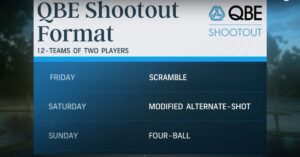What Is A Consolation Match In Golf?: Understanding its Purpose and Rules
Golf is a game of skill, strategy, and determination. Whether you’re a seasoned player or just starting out, understanding the various formats and rules of golf tournaments is essential. One such format that often arises in competitive golf events is the consolation match.
The consolation match in golf serves as a way to determine the final rankings for players who did not advance to the championship or semifinal rounds. It provides an opportunity for these players to compete against one another, showcase their skills, and potentially secure a higher final position.
In this article, we will delve into the concept of the consolation match in golf, exploring its purpose, rules.
Consolation Match in Golf: Understanding the Format and Purpose

In golf, a consolation match refers to a match that takes place after a player or team has been eliminated from a tournament or competition. It is designed to provide participants with an opportunity to continue playing and potentially earn a lower placement or consolation prize.
The purpose of a consolation match is to maintain player engagement and competitive spirit, even after being eliminated from contention for the top positions. It offers a chance for players to showcase their skills, compete against others in a similar situation, and potentially redeem themselves after a disappointing performance.
Consolation matches are commonly used in match play formats, where players or teams compete head-to-head rather than against the entire field.
In these formats, the winners of each match progress to the next round, while the losers are eliminated. Once players or teams are eliminated, they may be paired up to play against each other in subsequent rounds, forming a consolation bracket.
The structure and significance of consolation matches can vary depending on the specific tournament or competition rules. In some cases, they may have no bearing on the final standings or rankings. However, in other instances, consolation matches may determine lower placements or provide an opportunity to earn smaller prizes or recognition.
How do Players qualify for Golf Consolation Matches?

The qualification process for consolation matches in golf tournaments or competitions depends on the specific format and rules established by the event organizers.
Here are a few common scenarios:
Match Play Format
In match play tournaments, players or teams compete head-to-head, with the winners advancing to the next round and the losers being eliminated.
Once a player or team is eliminated from the main bracket, they may be entered into a consolation bracket, where they have the opportunity to play against other eliminated participants. The matchups in the consolation bracket are typically determined by the order of elimination from the main bracket.
Stroke Play Format
In stroke play tournaments, where players’ scores are added up over the course of multiple rounds, the concept of consolation matches may not be as prevalent.
However, in some cases, if a tournament has multiple divisions or flights based on handicap or skill level, players who do not make the cut for the final round or the top positions in their respective flights may have the option to compete in a consolation round.
This allows them to continue playing and potentially compete for lower placements or prizes.
Invitational or Qualifying Tournaments:
In invitational tournaments or events with qualification stages, consolation matches may not be a standard part of the competition.
In these cases, players who do not qualify for the final rounds or the top positions may not have the opportunity to participate in additional matches or rounds.
5 Examples of Famous Consolation Matches in Golf History

Throughout golf’s rich history, there have been numerous thrilling consolation matches that have captivated fans and showcased the extraordinary talents of players.
Let’s delve into some of these memorable showdowns that have left an indelible mark on the sport.
1. 1962 Masters Tournament: Arnold Palmer vs. Dow Finsterwald
After failing to make the cut for the final rounds, Arnold Palmer and Dow Finsterwald played a consolation match. Palmer emerged as the winner, shooting a 68 to Finsterwald’s 70.
2. 1983 Open Championship: Hale Irwin vs Denis Durnian
Hale Irwin and Denis Durnian competed in a consolation match after missing the cut for the final rounds. Irwin won the match with a score of 67, securing a better overall finish in the tournament.
3. 2005 U.S. Open: Tiger Woods vs Ernie Els
In an unusual circumstance, both Tiger Woods and Ernie Els, two top-ranked golfers, missed the cut at the U.S. Open. They decided to play a friendly consolation match, with Woods ultimately winning by a single stroke.
4. 2010 PGA Championship: Bubba Watson vs. Francesco Molinari
Bubba Watson and Francesco Molinari faced off in a consolation match after narrowly missing the cut for the final rounds. Watson prevailed with a score of 68, securing a respectable finish in the championship.
5. 2019 Masters Tournament: Ian Poulter vs. Tiger Woods
Following a disappointing performance, Ian Poulter and Tiger Woods played a consolation match at Augusta National. Woods emerged as the winner, shooting a 64 to Poulter’s 68, providing a small consolation for his Masters’ week.
Frequently Asked Questions
Here, we address common questions about these matches, their purpose, eligibility, impact on rankings, and more. Explore the answers below to gain a deeper understanding of this aspect of golf tournaments.
How Are Consolation Matches Different From Regular Matches In Golf?
Consolation Matches differ from regular matches in that they involve players who have been eliminated from the main tournament. Regular matches are part of the main competition and determine who advances to the next round or ultimately wins the tournament.
Do Consolation Matches Affect A Player’s Official Ranking Or Statistics?
Consolation Matches may or may not affect a player’s official ranking or statistics, depending on the tournament and the governing body’s rules. In some cases,
Consolation Match results may be considered for rankings, while in others, they may not have any impact.
Can Consolation Matches Be Used To Determine Tiebreakers In Golf Tournaments?
In certain golf tournaments, Consolation Matches can be used as tiebreakers to determine final standings. If players have the same scores or rankings, a Consolation Match might be organized to break the tie and determine the order of finish.
Conclusion
Consolation matches offer participants the opportunity to end a tournament on a positive note and compete for a final ranking position. The format, rules, and scoring systems of these matches may differ depending on the sport or event, but they ultimately aim to provide fair and engaging competition for all involved.



![How To Become An Amateur Golfer? [From Novice to Natural] how-to-become-an-amateur-golfer](https://giftedgolfers.com/wp-content/uploads/2023/05/how-to-become-an-amateur-golfer-300x157.jpg)


